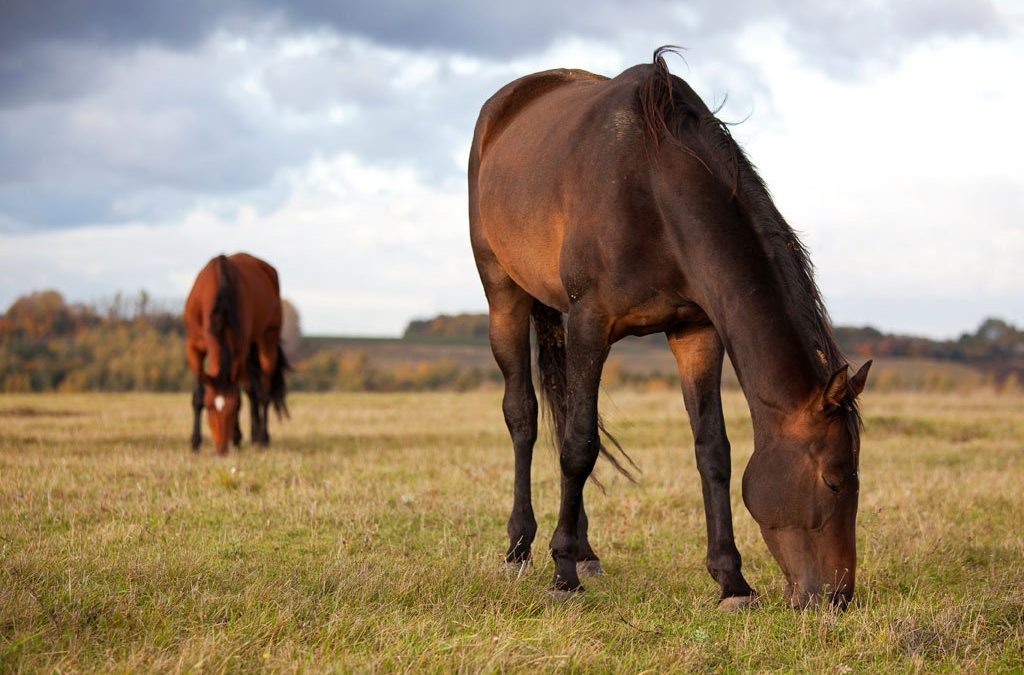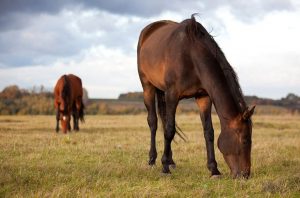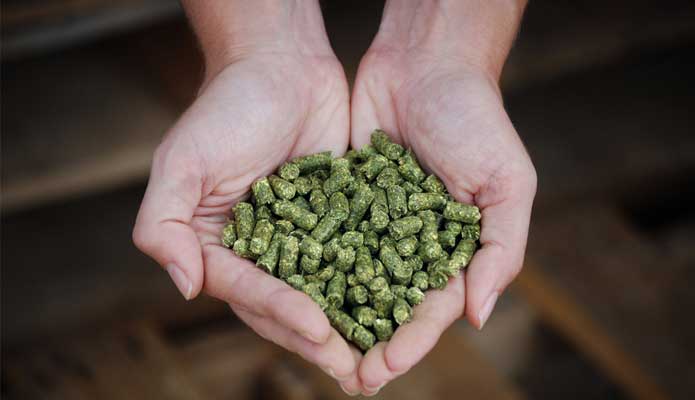
Horse owners have different opinions when it comes to making Alfalfa a part of the equine diet. Some believe it to be an excellent staple while others perceive it as a kind of poisonous for the animal, so is feeding alfalfa pellets instead of grain recommended for horses?
Alfalfa is a green and leafy food that horses love eating. However, it has a little bad reputation in the world of horse health for some reasons.

In this guide, let us discuss all you should know about this forage to decide whether you can feed your animal Alfalfa pellets instead of grain.
Feeding Alfalfa Pellets Instead of Grain – A Complete Guide
Alfalfa is a perennial legume grown in many regions in the U.S. for horses and other livestock. It is an easy-to-digest feed with a healthy balance of essential nutrients.
When consumed in pelleted form, alfalfa offers similar nutrients and fiber as the hay while avoiding all the mess and fuss. One of the best things about alfalfa is that horses love it. When given a chance to choose between feeds, horses are likely to go with alfalfa.
While feeding alfalfa to your horse has several benefits, owners are confused about whether it can be used instead of grain. The short answer is ‘YES’.
Alfalfa pellets can be an excellent source of calories and can be used as a substitute for excessive amounts of grain for horses trying to intake more calories. It makes a great supplement for the horse diet because it is higher in energy, lower in insoluble fiber, and richer in calcium than other feeds.
As alfalfa pellets contain high amounts of protein and energy, they make it easier to meet dietary needs with low levels of supplementation. However, it is important to note that alfalfa pellets are not for every horse.
As they are forage-based, you can use them as an alternative to grain to add calories to the animal’s diet. Forage-based calories don’t cause problems like those associated with high-sugar and starch feeds such as grains. Alfalfa pellets can provide calories to the horse’s diet minus the ‘hot’ factor.
How Much Alfalfa Pellets to Feed a Horse?
Alfalfa pellets make one of the best supplements for horses for many reasons. It is particularly useful for hard keepers as it is highly palatable. It is an amazing source of calories for horses who require help in putting on weight or whose exercise and activities demand additional energy. Its easy digestibility also makes it perfect for underweight horses and for giving extra calories during winter.
Alfalfa pellets are also ideal for horses suffering from dental problems as they can easily chew pellets soaked in water. The solubility and nutrient content help treat or prevent colic and ulcers. Alfalfa pellets also provide an easy-to-digest calorie source for young horses. In short, alfalfa pellets can be given as a supplement to most horses except in a few cases.

How much of alfalfa pellets you should feed a horse depends on the calories you want the animal to get from the feed versus other sources. However, as a general suggestion, you can feed anywhere from a few pounds to any amount, depending on the age and activity level of the horse.
These pellets can be fed dry though many animals prefer them soaked in water and fed as a mash. Old or young horses and those with dental issues would require soaking the pellets.
Horses can be sensitive to changes in diet, so it is important that you make any changes gradually. When introducing alfalfa pellets to your animal’s diet, it is advisable to start with a quarter-pound per day and slowly increase it to the desired amount while keeping track of how the horse responds and feels and any problems faced.
Alfalfa Pellets For Senior Horses – What You Should Know?
While Alfalfa pellets are great for supplementing a horse’s diet to provide it with sufficient energy, protein, and nutrients, not every horse finds it beneficial.
There is no harm in feeding alfalfa pellets to senior horses as a part of their everyday diet. However, a concern associated with alfalfa is weight gain in the absence of adequate exercise.
Alfalfa pellets may provide more energy and protein than what non-working horses may need, resulting in weight gain and obesity. So it is best to avoid feeding these pellets to overweight, senior, and easy keepers.
They should be given mature grass hay with lower calorie content. Senior horses suffering from health problems like impaired liver or kidney should also not be fed alfalfa pellets as they can find difficulty processing the protein.
Best Alfalfa Pellets For Horses – UPDATED 2022
While there are several options available for those who want to introduce alfalfa pellets to their horses’ diet as a supplement, the best are those that exhibit nice fragrance and vibrant color and are certified to be organic. Here are a few products you can consider.

Standlee Hay Company Premium Alfalfa Pellet
This is a high-quality forage product that contains only pure alfalfa without any binders or fillers. The pellets are green and fragrant and come in a 40lbs bag.
Oasis Organics Organic Alfalfa Pellets
These are non-GMO alfalfa pellets certified to be organic and cut from certified alfalfa fields. They are rich in color and have a great balance of nutrients and are free of any additives, pesticides, and herbicides.
Coyote Creek Organic Alfalfa Pellets
This is another non-GMO, certified organic alfalfa product known to provide an omega-3 and protein boost to horses. It comes in a 20lbs bag and can be fed to a variety of livestock animals.
Final Thoughts
In summary, the nutrient content and palatability of alfalfa pellets make them a logical forage for horses. They can be added to a horse’s daily diet for a balanced intake of calories, energy, protein, calcium, and other nutrients.
Being calorie-dense and easy to feed, alfalfa pellets can be used instead of grain or mixed with grain to fulfill the dietary needs of most horses, depending on their activity level, age, and condition.